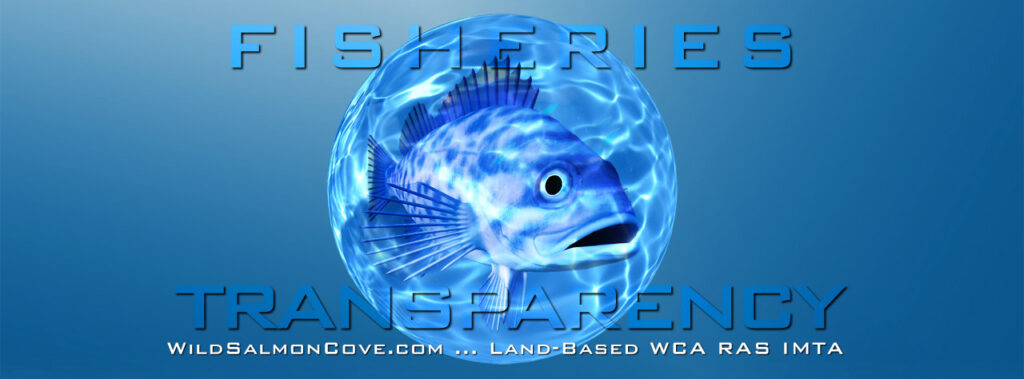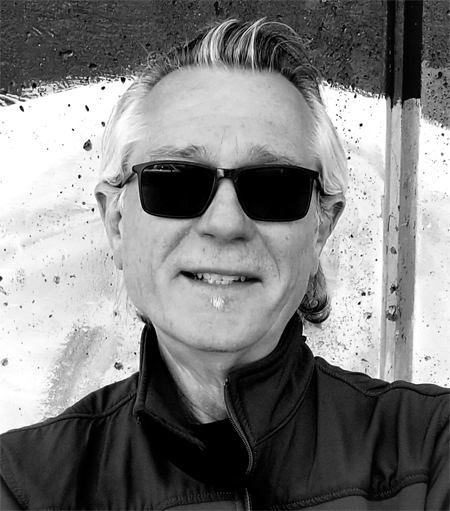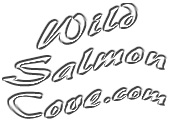Part 3 of a 4 part series … Read Part 1 … Part 2

Our new normal, VALUES TRANSPARENCY and eschews CORRUPTION … right?
Hmm, not so fast … Canadian fisheries are currently struggling under more than ONE murky controversy.
Allegations of corruption have simmered for decades, and a few times over the last several years they’ve also raged – today’s Mi’kmaq Indigenous assaults are making headlines around the world. Fisheries corruption is floating like flotsam in the middle of the pandemic, and an upcoming election.
When an industry is lean and struggling, it’s easier to see its bones, and weaknesses.
Canadian DFO scientist, Dr. Kristi Miller-Saunders, who holds a Ph.D. from Stanford University, told news media, AGAIN, that her government employer is misstating scientific facts about open-net fish farms.
She made similar allegations in 2011.
The good doctor Kristi has worked for the DFO for 25 years and is a well-respected scientist. She has warned governments for several years about the dangers of open-net fish farms to oceans and sea life.
Maclean’s magazine also reported Dr. Miller-Saunders’ findings in 2017, in this article; “Unmuzzled government scientists are ready to talk – federal government scientists are bursting to discuss a lost decade. Ask them anything.”
Dr. Miller-Saunders was criticized then too by the open-net fish farm industry, as she still is today in a profit-driven effort to undermine her credibility. This time around her findings are being taken seriously, as evidenced in this damning and exclusive 2020 article from the Globe & Mail; “Scientist at DFO says Ottawa is too beholden to fish farms.”
Quote: “A federal scientist has accused the Department of Fisheries and Oceans of underplaying the threat of open-net fish farms to Pacific salmon and too often acting in the interests of British Columbia’s profitable fish-farming industry.”
Here’s another quote from another article in MacLean’s magazine from 2011; “Science, one of the world’s top research journals, published Miller’s findings in January. The journal considered the work so significant it notified “over 7,400” journalists worldwide about Miller’s “Suffering Salmon” study.”
2020 Excerpt: Dr. Miller-Saunders said “Fisheries and Oceans appears to be bending over backward to help the open-net fish farm industry, which plays the dual role as regulator and industry advocate.”
Anyone ethical clearly knows that a dual role of “regulator and advocate” is a perfect breeding ground for corruption.
In 2011, when Dr. Miller-Saunders first rang the alarm, I was the Business Development & Communications Officer for the BC Salmon Marketing Council, and it was then that I also first began to voice my concern about the damage open-net fish farms have on oceans and sea life.
The doctor and I were not alone however; Many fishers and smaller processors, plus a handful of various specialists in the BC salmon industry were making the same allegations, and receiving extremely aggressive warnings from federal bureaucrats to immediately stop criticizing, or even mention open-net farmers in any capacity.
Fish farmers in Canada were fully protected by governments and completely off limits.
Wild fishers and processors were right stunned when we were muzzled because we thought we operated in a marketing arena like other industries where it was encouraged to be competitive.
The warning to me personally was clear; Stop criticizing and even talking about fish farms, or we will cut ALL of your government funding.
The gag order felt like an attack on democracy – described by Alexis de Tocqueville in the 1800s. “Tocqueville was acutely aware of the dangers posed by the rise, from within the heart of the new civil society, of capitalist manufacturing industry and a new social power group (an ‘aristocracy’, he called them) of industrial manufacturers, whose power of control over capital threatens the freedom and pluralism and equality so essential for democracy.”
Today, it isn’t only practitioners in fisheries, and legitimate news media companies who are warning governments about equality, ethics, and democracy respective of the environment and climate change.
Government are now warning themselves too, and ironically with little success.
In 2019, Canada’s Liberal Prime Minister Justin Trudeau ordered open-net pens out of the ocean on the west coast in BC. He wants them transitioned to land-based fish farms over the next several years. The reaction from open-net farmers was so severe the prime minister softened his directive considerably. His team still maintains though, that open-net pens have to be transitioned to either deep sea closed containment, or land-based aqua farms where the operations will be safer for oceans and sea life. The PM’s initial directive to move open-net pens to land-based operations within five years was too aggressive, and many of us spoke out against the severe timeline.
The question now – when?
B.C. Agriculture Minister Lana Popham has also expressed concern over open-net fish farms and was unfairly attacked by an industry more concerned with protecting profits, than they are about oceans and sea life.
How is it that so many qualified people all over the world are calling for the end of an outmoded and destructive farming process, and yet governments balk?
Land-based aqua farming operations will employ the same number of staff, and in some cases even more than open-net operations, plus the skill level of some employees will rise considerably.
As Bob Chamberlin, of Wild Salmon Forever and former Chief of the Kwikwasut’inuxw Haxwa’mis reports in a recent CBC article, “sea lice and viruses from farmed salmon are fatally infecting juvenile salmon as they swim through the narrow Discovery Islands. Consultation announcement is a good first step, but it should include First Nations on the Fraser River who depend on wild salmon.”
Open net fish farms negatively impact First Nations, while land-based RAS IMTA will improve the lives and livelihoods of Indigenous communities along Canada’s west coast.
Land-based RAS IMTA is a highly advanced high-tech business, and the complex technology is one big reason it intimidates most open-net farmers. They simply don’t have the skills, so instead they block evolution to an ecosystem that is better for oceans and sea life. They do it by creating confusion, and by attacking scientists who don’t support their agenda for profit.
Corruption is out of control in fisheries around the world, and it reaches across every sector.
For example; If you ordered a package of sockeye salmon from British Columbia, and somewhere along the way a handler covertly removed the expensive sockeye and replaced it with cheaper chum salmon, and everyone in the supply chain knew it was happening but hid it from you as the customer – what would you think?
What if Seafood Bait & Switch was a common occurrence?
Would you think collusion and corruption?
Unfortunately, Bait & Switch happens in the seafood business every day at an alarming rate of about 50%.
Can you imagine if this FAIL RATE happened in other sectors, like the auto industry or maybe pharmaceuticals? It continues to happen in fisheries because over many decades, governments have, in effect, partnered with powerful monopolies, and if they bust these oligarchs now, everyone goes down. Plato and Aristotle had the manifestations of political corruption figured out long ago.
You tell on me.
I tell on you.
Trapping inexperienced politicians who initially have good and ethical intent is a time-honoured tradition.
It’s seafood fraud and corruption, plain and simple, and if you think it’s a myth, watch this short clip to see where and how often seafood fraud and fisheries corruption occurs.
Another reason companies and governments get away with such blatant corruption is because we are all being fed confusing and FAKE information by disreputable companies and their supporting casts of manipulative public relations communicators. It’s not ethical of course, but it is legal.
Deceptive media companies would rather have you guess where their loyalties lie, forgive the pun, because then … they have more freedom to report only from their clients’ perspectives. Media companies that fail to clearly reveal their affiliations and bias lose trust and risk repercussion on social media.
Transparency = truth = trust
If a media publication has NEWS in their name, and for any reason they fail to deliver information in an UN-biased manner – they simply can’t be trusted, i.e., Fox News.
The DEFINITION of NEWS by Merriam Webster is: “a report of recent events”.
There is absolutely no mention of BIAS in Webster’s or anyone else’s descriptions, yet audiences have interpreted and expect the definition of news to mean: an “UN-BIASED” report of recent events. Audiences do it because they’ve been conditioned over many decades to think that way. Thankfully, traditions are changing as concepts evolve in the 2020 WOKE era.
Although fake news is nowhere near as bad as Trump claims, a disturbingly large number of “news” companies have agendas not based on truth.
Back in the day when audiences had slightly more trust in news media, we didn’t have social media or the internet to compare notes. It was almost impossible, unless you invested substantial time and money doing your own research to identify whether the information was accurate.
Professional media advisors, and I count myself as one for over two decades, have for many years trained ethical corporate executives and politicians how to manage manipulative news media. Starting in the late-nineties, I wrote and published CRISIS MEDIA business newsletters read by thousands of c-suite executives and high-profile politicians, including a dozen U.S. senators, plus hundreds of MBA students at Harvard Law School. It was a large part of my business for almost two decades, so consequently, as a media critic I’m familiar with all levels of Beat Reporting.
Today, technology delivers much of what we need to make good decisions for fisheries, and much of it is dependent on BIG DATA. It’s easier today for example to track and monitor a wide variety and large volume of data automatically using smart contracts managed by AI – artificial intelligence.
Blockchain on the distributed web is a powerful data tool that can be affordably managed on a small immutable enterprise. If you’re not familiar with this technology, you can catch up here…
I don’t want to be over-critical of BIASED ADVERTORIAL NEWS reporting because it serves an economic purpose for those directly involved – it’s a paycheck. Don’t however, mistake a real NEWS company for a blog – like this blog you’re reading now for example that openly, and ONLY promotes wild and land-based salmon enterprises. I don’t feign to be a news company.
Blogs should never pretend to be news. Companies, especially those with NEWS in their name, have a tacit and ethical obligation to be neutral. Unfortunately, it’s not always the case.
The information in advertorial fake news publications often target specific industries – fisheries in our case. ECHO CHAMBER industry-information publications provide a platform for companies that struggle to win a mainstream audience, one reason being that their product might not appeal to the sensibilities of conscientious consumers – the #EthicalMajority, but there are many other reasons.
The tobacco industry was one of the first to develop ADVERTORIAL NEWS magazines, and over the years many other industries copied their covert strategies.
Regarding fisheries, some online publications on first inspection look like a traditional news magazine, but when you do a search on their website for “LAND-BASED” it delivers results that MOSTLY CRITICIZE the ethical solutions that the environmental world embraces – it’s a hint something is skewed.
For example, according to Sea West News, it seems that land-based aqua farming isn’t a scientific or economic process worth pursuing.
Is that what we expect from a real NEWS company?
The truth is that investors all over the world, including ironically, open-net farmers, are investing heavily in land-based RAS IMTA aqua farms. It’s the reality that some don’t want you to know, and if you listened to them, you’d be woefully misinformed and miss out on legitimate and important growth opportunities.
Below are headlines from Sea West News regarding Land-Based Aquaculture, 08/20; (based on a search on their site for “land-based”).
:: Study shows challenges facing land-based salmon farms in BC
:: Energy use, emissions will increase with land-based, but …
:: RAS in Peace: The quick and dead in land-based fish farming
:: Canadian owned land-based farm goes bankrupt
Are you getting the biased ECHO drift?
I get it … because in my world of environmentally-friendly fisheries, you either support a healthy ocean, or you don’t. There is no half-way.
During 9/11, President Bush said it even more clearly;
You’re either with us, or against us.
It’s that simple.
Respected fisheries NEWS companies look like this;
TheFishSite … SalmonBusiness … Hakai and many others.
John Paul Fraser, the executive director of the BC Salmon Farmers Association is quoted in a Sea West blog; “Using a full tool belt of methods, BC’s salmon farmers have made it a priority to monitor, and treat our farmed populations for SEA LICE in order to help reduce the likelihood of the sea lice spreading back to the wild populations”.
So my simple question is; Why would BC open-net pen salmon farmers need a “full tool belt of methods” to combat an environmental issue that they STEADFASTLY REFUSE TO ADMIT is a serious issue?
It’s a simple question …
Here’s another simple question;
If industry publications are little more than echo chambers, why should readers be concerned?
Simple, it’s because still, most people in the fisheries and seafood industry, including consumers/seafood lovers, are confused about how news media really works. As a result, slick pseudo news organizations leverage this weakness.
Another challenge regarding echo chamber publications is that the pseudo specialists within them, who evangelize “their version of science” as gospel, quite often do not have an appropriate background. Spokespersons in such a sensitive and volatile industry, should ideally be at least trained to dispense information about critically related subjects like climate control and species extinction, especially when not even the most advanced scientists in the world are sure of the RISING TIDES outcome. We do know however, that open-net fish farms cause pollution, and that pollution of all kind raises the temperature of oceans.
It shouldn’t be a free-for-all of opinions for blogging interns or babysitting veterinarians with outdated degrees. When it comes to ocean health, we should err on the side of caution, but we all know it’s not the case.
Open-net pen fish farm workers for example are of course biased, and usually not trained or qualified to disseminate information on complex land-based aqua issues. It is however, easy to see why they feel personally threatened by a new RAS IMTA process that is so complicated they would have to go back to university to earn a more relevant degree in contemporary biotechnology to understand it. This type of bias is common, but it is rarely disclosed.
It’s time to drop anchor on corruption.
Part 4 of a 4 part series is coming soon …

Maurice Cardinal has been a fisheries marketing and communications advisor and writer in British Columbia for almost a decade and has worked with leading organizations, NGOs, and governments in Canada and abroad.
